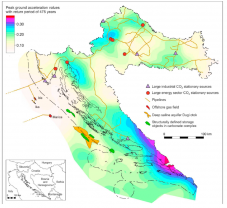Why should you enrol? Interview to prof. Bruno Saftić

Prof. Bruno Saftić from Zagreb University answers to some questions about the Master:
Why should you enrol in the Master on CO2 Geological Storage?
To get a specific knowledge, needed to participate in the pioneering industrial projects using this emerging technology. The Master will give the attendants an edge in the currently fast reshaping sector of subsurface resources utilisation, a sector which is very competitive and operates worldwide.
What is special about the Master on CO2 geological storage?
It is primarily for geoscientists, but it is actually interdisciplinary. First of all, the geological, geophysical and geochemical exploration techniques have to be tailored to correctly estimate the CO2 geological storage resource, to meet the requirements for the timely development of CCS projects. Second, this study is for geoscientists to have a more detailed overview of petroleum engineering methods in reservoir management, numerical simulation and drilling. Third, but not least, it allows young professionals to get enough information on the specific regulatory and societal factors that need to be taken into account in the development of CCS technology. Most importantly, roughly half of the study consists of an individual project, where each student will have the opportunity to be mentored by a researcher from one of CO2GeoNet institutes, who are currently working on CO2 geological storage projects. A good final thesis will therefore already offer an opportunity for a scientific publication, which is surely an added value for a student upon completion of the study.
What kind of plus does the Master on CO2 Geological storage bring to the students who will attend?
Apart from completing a postgraduate specialist study course which by itself has an added value described in the learning outcomes, successful students will be for several months working in a stimulative environment of young people from other countries and with a direct access to both instructors and mentors, because this will be a small group. This group will also work on joint projects which will help in getting the skills needed for interdisciplinary team work.
What are you going to teach?
I will teach mainly on storage site selection methods. We will work on a specific discourse that each geoscientist has to understand when working to prepare any resource for exploitation – the concept of resources vs. reserves in general. Then we will go deep in the specific exploration methods depending on the various targets that might become geological storages – deep saline aquifers, depleted oil and gas reservoirs, salt formations or unmineable coal deposits. If there will be any candidates lacking the geoscientific background I will also participate in the bridging “Module 0” that will be introduced this year.
